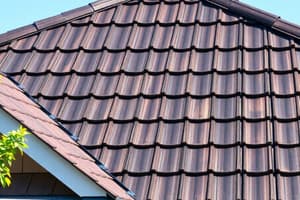Podcast
Questions and Answers
What are the two protective coverings of the brain & spinal cord?
What are the two protective coverings of the brain & spinal cord?
Outer covering is bone. Inner covering is meninges.
What are the three membranous layers of the meninges?
What are the three membranous layers of the meninges?
Dura mater, Arachnoid mater, Pia mater.
What is the Dura mater?
What is the Dura mater?
A membranous layer of meninges that is strong and fibrous.
What is the Falx cerebri?
What is the Falx cerebri?
What are dural sinuses?
What are dural sinuses?
What is the Superior sagittal sinus?
What is the Superior sagittal sinus?
What is the Falx cerebelli?
What is the Falx cerebelli?
What is the Tentorium cerebelli?
What is the Tentorium cerebelli?
What is Arachnoid mater?
What is Arachnoid mater?
What is Pia mater?
What is Pia mater?
What are several spaces that exist between & around the meninges?
What are several spaces that exist between & around the meninges?
What is the Epidural space?
What is the Epidural space?
What is the Subdural space?
What is the Subdural space?
What is the Subarachnoid space?
What is the Subarachnoid space?
What are the functions of the cerebrospinal fluid (CSF)?
What are the functions of the cerebrospinal fluid (CSF)?
What are the fluid spaces of the CSF?
What are the fluid spaces of the CSF?
Where is cerebrospinal fluid found?
Where is cerebrospinal fluid found?
What are the ventricles within the brain?
What are the ventricles within the brain?
What is the first & second ventricles within the brain?
What is the first & second ventricles within the brain?
What is the third ventricle within the brain?
What is the third ventricle within the brain?
What is the fourth ventricle within the brain?
What is the fourth ventricle within the brain?
How does the foundation and circulation of CSF occur?
How does the foundation and circulation of CSF occur?
What is the structure of the spinal cord?
What is the structure of the spinal cord?
Flashcards are hidden until you start studying
Study Notes
Protective Coverings of the CNS
- Two main protective covering systems for the brain and spinal cord: outer covering is bone (cranial bones for the brain, vertebrae for the spinal cord) and inner covering is meninges.
- Meninges extend beyond the end of the spinal cord into the spinal cavity.
Meninges Layers
- Meninges consist of three membranous layers: dura mater, arachnoid mater, and pia mater.
Dura Mater
- Strong, white fibrous tissue, serving as the outer layer of the meninges and the inner periosteum of cranial bones.
- Has three significant extensions: falx cerebri, falx cerebelli, and tentorium cerebelli.
Falx Cerebri
- An extension of the dura mater that projects into the longitudinal fissure between the two cerebral hemispheres.
- Contains dural sinuses and superior sagittal sinus, functioning similarly to veins by collecting blood from brain tissues.
Dural Sinuses
- Located within falx cerebri, they collect blood from the brain for return to the heart.
Superior Sagittal Sinus
- A major dural sinus that runs along the superior aspect of the falx cerebri.
Falx Cerebelli
- An extension of the dura mater, separating the two hemispheres of the cerebellum.
Tentorium Cerebelli
- An extension of the dura mater that separates the cerebellum from the cerebrum.
Arachnoid Mater
- A delicate, spiderweb-like membranous layer found between the dura mater and pia mater.
Pia Mater
- The innermost layer of the meninges, transparent and adherent to the surface of the brain and spinal cord.
- Contains blood vessels and forms a slender filament called 'filum terminale', which blends with the dura mater at the coccyx.
Spaces Between & Around Meninges
- Three important spaces: epidural space, subdural space, subarachnoid space.
Epidural Space
- Located between the dura mater and the bony encasement of the spinal cord, contains supportive fat and connective tissue.
Subdural Space
- Situated between the dura mater and arachnoid mater, contains lubricating serous fluid.
Subarachnoid Space
- Found between the arachnoid mater and pia mater, contains a significant amount of cerebrospinal fluid (CSF).
Functions of Cerebrospinal Fluid (CSF)
- Provides cushioning and support to the brain and spinal cord.
- Acts as a circulating reservoir, monitored by the brain for changes in the internal environment.
Fluid Spaces of CSF
- Comprises cerebrospinal fluid and four brain ventricles: 1st and 2nd (lateral), 3rd, and 4th ventricles.
Ventricles in the Brain
- Four fluid-filled spaces within the brain: first and second ventricles located in each hemisphere, the third ventricle below and medial to the lateral ventricles, and the fourth ventricle situated at the brainstem.
CSF Circulation
- CSF is formed from blood in the choroid plexus and follows a specific circulation path from lateral ventricles to the central canal of the spinal cord and subarachnoid space before absorption into venous blood via arachnoid villi.
Structure of the Spinal Cord
- Extends from the foramen magnum to the lower border of the first lumbar vertebra; features an oval-shaped cylinder that tapers downwards with two bulges (cervical and lumbar).
Studying That Suits You
Use AI to generate personalized quizzes and flashcards to suit your learning preferences.




